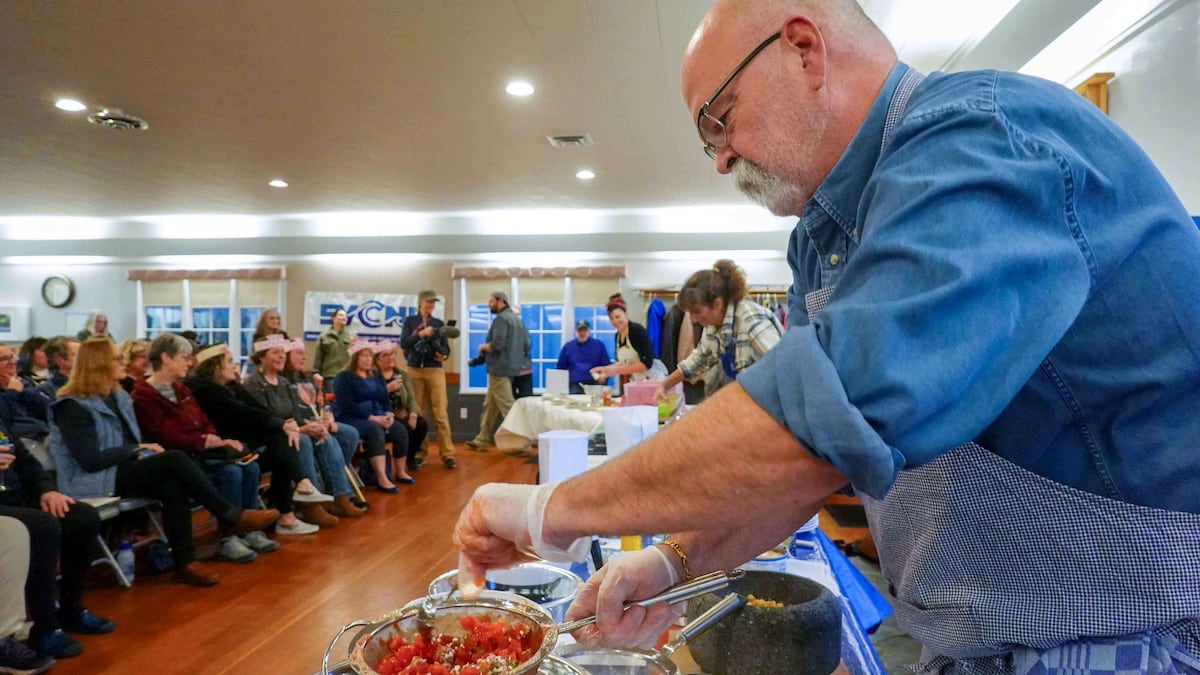
Christopher Mullins of Manzanita, Ore., strains and seasons canned tomatoes.
Alejandro Figueroa / OPB
The Pine Grove Community House in Manzanita, Oregon, is packed with Nehalem Bay residents. To the front of the room, three tables are set up with all sorts of bowls, glassware and non-perishable goods, ranging from cans of chicken and oysters to crackers and ketchup packets.
Host Jo Newhouse, a Nehalem Bay-area resident, starts up a 20-minute timer. As soon as she counts down, the crowd lets out a loud cheer and chefs race to put a dish together.
------Advertisement-----
All three cooks are residents from the Nehalem Bay area: Christopher Mullins is from Manzanita, Kris Troutman and Jessi Just both live in Nehalem.
Just, executive director for a Wheeler, Oregon-based nonprofit, quickly scoops smoked oysters out of a can while Mullins, a retired antique dealer, opens cans of corn and garbanzo beans. In between them, Troutman prepares marinated mushrooms and pickled vegetables she grew and picked herself.
------Advertisement-----
The cooking contest, hosted by the Emergency Volunteer Corps of Nehalem Bay on Feb. 15, is like an episode of the Food Network show, “Chopped.” In that show, there are three rounds, and chefs must cook an entire meal with a basket full of mystery ingredients.
The volunteer corps contest, however, has a twist. Cooks can only use shelf-stable foods, they can’t use heat or water, and they only have 20 minutes to whip up a plate. Then, three judges — all area chefs or restaurant owners — will rate the dishes based on taste, creativity and presentation.

Jessi Just of Nehalem, Ore., puts the finishing touches on a parfait dessert made with vanilla pudding, strawberry pie filling and crushed hazelnuts.
Alejandro Figueroa / OPB
The whole idea behind the contest is to encourage coastal Oregon residents to think about natural disaster preparedness and shelf stable foods in a different way. That’s because, while the Oregon coast is undeniably beautiful, it’s also susceptible to major natural disasters like earthquakes, tsunamis, wildfires and floods. If a severe enough disaster happens, like The Big One, or the , it could cut off Oregon coastal communities from the rest of the state for weeks, says Trish Johnson, the president of the volunteer corps.
“That’s why we’re trying to encourage people to think about having shelf-stable foods that don’t require heat or water so they can feed themselves and be resilient enough not to have to depend on external resources which won’t be coming,” Johnson says.
Related:
Johnson says most people tend to either be under prepared or not at all, despite experts warning the area could be isolated for at least 30 days after a major earthquake or tsunami.
THANKS TO OUR SPONSOR:
Nationwide, about 51% of adults say they’re prepared for a natural disaster, while 11% of people say they are not prepared, according to a 2023 survey report.
The storing at least a several-day supply of non-perishable food, choosing some of the usual foods a household will eat and considering dietary restrictions like allergies to nuts or gluten.
Related:
Johnson says while having cans of tuna or peanut butter and jelly around is an option, it doesn’t have to be the only option. People can prepare for the worst with foods that are familiar and comforting.
“So this was a kind of a teaser to get people to think about food in a fun way without scaring them,” Johnson says. “Because it is kind of scary to think about being isolated and not having the resources that you’d like to have at your fingertips.”
Back at the community house, the time has run out. Just is the first to present her dish. On the menu is her spinoff on Oysters Rockefeller — usually made with fresh shellfish.
“This is smoked oysters from a can reimagined and reconstructed back into their shells from whence they came,” Just tells the judges.

The spinoff on Oysters Rockefeller prepared by Jessi Just.
Alejandro Figueroa / OPB
The oysters are sitting on a bed of rock salt to simulate crushed ice. There’s also a small glass with a cocktail sauce made out of fast-food restaurant ketchup packets, horseradish and lemon juice.
“I am a very deep appreciator of food. I would not consider myself a good cook,” she says.
The judges give Just’s dish a 54 out of a possible 90 points.
Up next, Mullins’ chicken fiesta stack dish surprises the judges — it includes layers of corn and black beans and a chicken salad made with rehydrated sour cream powder. He gets 84 points for his dish and he also wins the contest following a dessert round. He’s declared “Top Chef” by the judges.
For Mullins, the contest is a worthwhile experiment. He says it’s good to think about shelf stable foods in a different way, and that even though preparing for natural disasters might not be all fun, it doesn’t have to be scary.
“Food is a form of creativity for me and it brings people around the table to share a meal and good conversation,” Mullins says. ”It makes you really think about what you need to put aside for sustaining your life and having a little bit of pleasure along with it.”
Correction: The story has been updated with the correct spelling of Jessi Just’s name.

Christopher Mullins’ chicken fiesta stack dish made with canned corn and black beans, mashed chickpeas and a chicken salad with rehydrated sour cream powder.
Alejandro Figueroa / OPB
THANKS TO OUR SPONSOR:
